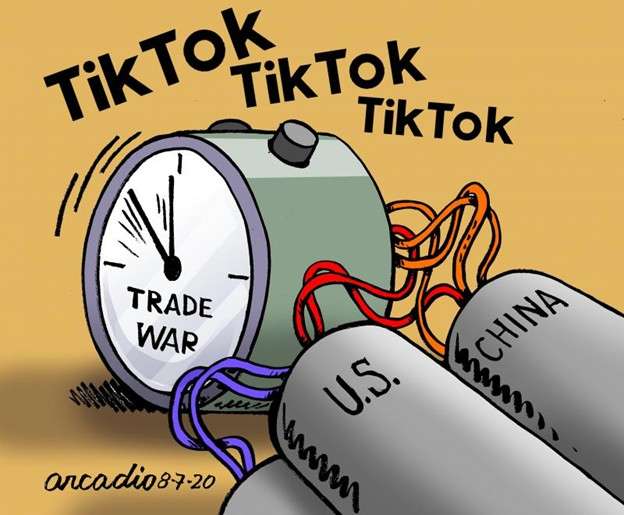
26 Apr War
“Keeping America out of foreign wars is a priority for Trump 2.0.” – The Lonely Realist
If the past is prologue, the foreign policy lesson taken from Trump 1.0 is that Trump 2.0 will assiduously avoid armed conflict. America will pursue its national interest by isolating itself militarily and economically, not committing itself outside its sphere of influence – the Western Hemisphere. President Trump addressed an array of foreign policy threats during his first term, including from North Korea, Iran and Venezuela. A review of the words and actions of Trump 1.0 provide insights into what can be expected during the Trump 2.0 Administration.
Let’s start with North Korea. After taking office in 2017, Trump 1.0 complained that President Obama had left him “with a war ready to start [with North Korea]” which, he declared, made denuclearization of North Korea his highest foreign policy priority. President Trump accordingly increased already rigorous sanctions, name-called North Korea’s ruler, Kim Jung Un, “little rocket man,” and threatened North Korea “with fire and fury like the world has never seen.” Those words – there was no military action – led to direct talks between the two leaders…, which resulted in President Trump in February 2019 declaring victory: “Where are we now? No missiles, no rockets, no nuclear testing. We’ve learned a lot. But much more importantly than all of it, much more important, much much more important than that, is, [Kim Jung Un and I] have a great relationship.” Unfortunately, none of this is true. Among other things, North Korea today has worked non-stop to develop more and better missiles and rockets and continued its nuclear testing. It is estimated to have assembled ~50 nuclear as well as advanced chemical and biological weapons and intercontinental ballistic missile delivery systems capable of targeting the United States. No progress was made during Trump 1.0 to denuclearize or disarm North Korea. Moreover, despite President Trump’s threats, Trump 1.0 never seriously considered unleashing “fire and fury” on North Korea.
This same strategy was pursued by Trump 1.0 with respect to Venezuela, with the same result. The Trump Administration first made regime change its priority, imposing sanctions and threatening military action, and then moved on. Its efforts had no effect. Although Trump 1.0 sanctions have continued, Nicolás Maduro, like Kim Jung Un, endures.
With respect to Iran, President Trump in his first term unilaterally withdrew from the 2015 Joint Comprehensive Plan of Action (JCPOA) that had been agreed among the Obama Administration, the EU, UK, Russia, France, China and Germany, calling it “one of the worst and most one-sided transactions the United States has ever entered into,” explaining that “it didn’t bring calm, it didn’t bring peace, and it never will.” Because the Iranian regime refused to renegotiate the 2015 deal, the Trump Administration imposed “maximum pressure” sanctions targeting the regime, Hezbollah, Hamas, the Assad regime in Syria, the Houthi rebels in Yemen, and Shiite militias in Iraq. Unfortunately, “maximum pressure” did not achieve the Trump 1.0 goal of regime change, a goal now abandoned by Trump 2.0. Today, America’s goal is to pressure Iran to fully dismantle its nuclear facilities (per National Security Adviser Waltz) or (per Ambassador Witkoff…, before he backtracked) to agree with Iran on a “nuclear verification program” that would defer the weaponization of Iran’s enriched uranium, the latter being substantially the same as the abandoned JCPOA. Because Iran’s nuclear capabilities are an existential threat to Israel, Israel has long lobbied for their complete destruction. President Trump in January reportedly vetoed Israeli Prime Minister Netanyahu’s request to take military action to do precisely that, expressing his preference for a diplomatic process and stating: “I’m not in a rush to [bomb Iran] because I think that Iran has a chance [of being] a great country and to live happily without death,” adding that “If there’s a [bombing] option, I think it would be very bad for Iran.” The Iran sanctions + threats + the negotiation offer accurately summarize the President’s strategy. Different from North Korea, however, negotiations with Iran have a reasonable chance of “success” whereby Iran would reduce the quantity of its 60% enriched uranium and cap enrichment at a lower level in return for the U.S. agreeing to lift sanctions. Such an agreement would be face-saving for both America and Iran and avoid the risks that would follow from escalation. Unfortunately, such a “middle ground” agreement (that is, the original Witkoff alternative), like the 2015 JCPOA agreement, would not truly degrade Iran’s nuclear capabilities. And yet, the alternative would be Trump 2.0 approval of Israeli military action to destroy Iran’s nuclear facilities – an overt act of war – in which Israeli forces almost certainly would use America’s bunker buster bombs and, perhaps, B-1 bombers.
QUESTION FOR READERS: WHAT DO YOU THINK WILL BE THE OUTCOME OF THE U.S.-IRAN TALKS?
Despite protestations to the contrary, President Trump’s foreign policy approach has been consistently isolationist, recoiling from Pax Americana as well as America’s commitments as an ally and power broker. John Bolton served as the Trump 1.0 National Security Adviser during 2018 and 2019 and reportedly was responsible for advising the President to bomb North Korea and Iran, advice the President rejected. As a Trump 1.0 adviser explained, “In [North Korea, Iran, Venezuela, etc.] Bolton wanted a war and the president didn’t.” President Trump remarked in 2020, “if I had listened to [Bolton], we would be in World War Six by now.” President Trump’s foreign policy instincts haven’t changed…, as evidenced by his interactions with Russia regarding Ukraine, his tariff policies, his approach to China, TikTok, and etc. The Trump 2.0 tactic towards Iran is indistinguishable from the threats, sanctions and negotiation offers of Trump 1.0 towards North Korea and Venezuela…, and towards Iran in 2018. As Secretary of State Cruz recently affirmed, “We do not want to see war. This is not a president that campaigned on starting wars.”
What, then, will America do should China blockade Taiwan? China has positioned itself to do so…, and to do so imminently. As America’s global rival, China has hardened itself for confrontation with “extreme scenario thinking,” more so after becoming the primary target of Trump 2.0 tariffs. President Trump has scrupulously avoided saying how America might respond to a Chinese blockade or invasion of Taiwan.
QUESTION FOR READERS: WHAT DO YOU THINK THE TRUMP ADMINISTRATION’S RESPONSE WILL WOULD BE TO A CHINESE BLOCKADE OF TAIWAN?
Finally (from a good friend)





jeffcsiegel
Posted at 12:51h, 27 AprilA CHINESE BLOCKADE OF TAIWAN would cause Trump to double the Chinese Tariff rates (and little else.)